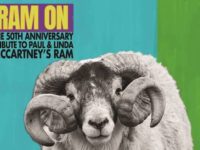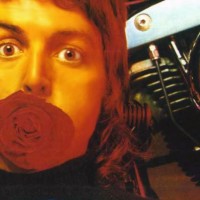Four words can best sum up Paul and Linda McCartney’s 1971 album Ram: “Heart of the Country.”
This homespun effort in the spirit of Paul’s solo debut McCartney chronicles a man basking in domesticity, fatherhood, and nature, and serves as an audial snapshot of the ex-Beatle’s life in Scotland. Upon its release, critics were underwhelmed with the folksy effort. Rolling Stone’s Jon Landau famously dismissed the album as “incredibly inconsequential” and “monumentally irrelevant.”
Hoping for a reevaluation of his album, Paul McCartney has reissued Ram as part of the Archive Collection in a variety of forms: the Deluxe Collector’s Edition Box Set, two-CD Special Edition, Download, and 180g 2LP Gatefold Vinyl (for more information on all configurations, visit Paul’s website). What results is an appreciation of Ram as representing a simpler time, a documentary of Paul’s so-called “hippie days” centered around family and farming.
According to the included DVD documentary Ramming, Paul wrote “Too Many People” in response to John Lennon’s occasional swipes at Paul’s post-Beatles work. “Too many people preaching practices, don’t let ‘em tell you what you wanna be,” he sings in a raspy voice. But most tracks celebrate love and, specifically, his wife Linda. “Long Haired Lady” honors the woman with the “flashing eyes” and declares that “I’ll sing your song, love is long, my love is long.” According to Ramming, Paul addresses Linda’s ex-husband in “Dear Boy,” essentially chiding him for letting Linda slip away. “I hope you never know, dear boy, how much you missed,” he croons. “And even when you fall in love, dear boy, it won’t be half as good as this.”
[SOMETHING ELSE! REWIND: In our original review of the new ‘Ram’ reissue, Nick DeRiso’s criticism of the sniping between Paul McCartney and John Lennon sparked an interesting debate.]
Other tracks feature more playful lyrics such as “Monkberry Moon Delight,” a rocker where Paul resurrects his “Lady Madonna” and “Hey Jude” vocal style. Bad puns abound (“So was I bound to crack with my head in this hole, and the horrible sound of tomato [matoes, matoes]. Don’t get left behind, ketch-up behind”) as well as nonsensical imagery, but that enhances the goofy yet catchy quality of the track. “Smile Away” proves Paul’s abilities as a songwriter — who else could write a charming ditty about smelly breath and feet?
The most well-known track to casual fans remains “Uncle Albert/Admiral Halsey,” the unlikely No. 1 hit that contains three separate movements. Complete with crazy accents, studio effects (making Paul sound like he is singing parts of the “hands across the water” section underwater), and a childlike story, it remains one of the strangest but more inventive songs Paul ever recorded.
Unfortunately, not all Ram tracks are consistent in quality and craftsmanship. “The Back Seat of My Car” never really gets off the ground, and tracks such as “3 Legs” and the naughty “Eat at Home” are pleasant but not particularly memorable. As with many McCartney albums, Ram contains gems within some meandering tracks.
As previously mentioned, Ram can be encapsulated by one enduring song, “Heart of the Country.” Featuring jazz-like scatting, subtle percussion, and deft finger-picking, the track allows Paul to indulge in celebrating country life. The lyrics “Heart of the country, where the holy people grow” lingers in one’s memory despite its seemingly simple words. That phrase alone synthesizes idealized pictures we tend to conjure of “the grass in the meadow,” sheep, horses, and other images out of a Grandma Moses painting. That lyric alone ranks among the best of Paul’s Beatles and solo compositions.
[SOMETHING ELSE! INTERVIEW: Henry McCullough talks about his time with Paul McCartney and Wings, Joe Cocker and the Grease Band — and how addiction almost cost him everything.]
Similar to the other Archive Collection releases—McCartney, Band on the Run, and McCartney II—most editions include a DVD with original videos for “Heart of the Country” and “3 Legs”; home video footage of Paul and Linda harmonizing on “Hey Diddle” as daughters Heather and Mary romp around them; and a live version of “Eat at Home” featuring backstage footage of that early version of Wings. A second CD contains bonus tracks such as the well-known “Another Day,” which was only released as a single, and “Oh Woman, Oh Why,” its original B-side. Other rarities include the charming “Little Woman Love,” the B-side to the “Mary Had A Little Lamb” single; the Ram outtake “A Love for You,” and the instrumentals “Great Cock and Seagull Race” and the pretty “Sunshine Sometime.”
As with the other Archive Collection releases, the remastering process has clarified the tracks that previously suffered from almost muffled production. Perhaps the one band member who benefits most from the reissue is drummer Denny Seiwell. While chiefly a jazz percussionist, Seiwell’s skill at keeping perfect time while adjusting his sound for a rock feel remains impressive. Need proof? Look no further than the bonus jam “Rode All Night,” where Seiwell furiously pounds the drums as McCartney screams over a scratchy guitar riff. In fact, why didn’t this cut make the final album?
Ram may not rank among McCartney’s all-time best work, but it serves as a snapshot of McCartney at a crucial time in his life. Newly “divorced” from the Beatles and struggling with forming his own identity, he adjusted to his life as a family man.
[ONE TRACK MIND: Laurence Juber discusses key songs from his tenure with Paul McCartney and Wings, along with favorite sides from his solo career and Al Stewart projects.]
Clearly he wished for another collaborator, and in a then-controversial move he enlisted his wife. Thus Ram became the only release in the McCartney catalog to bear both names. From then until 1980, he would perform with his group Wings and recruit another collaborator, this time a music industry veteran: Denny Laine.
But in 1971, McCartney just began this second act of his life and career; for those reasons, Ram remains a fascinating, if uneven, listen, and this deluxe reissue may allow for a more positive reevaluation of this complex work.
[amazon_enhanced asin=”B007L96VCY” container=”” container_class=”” price=”All” background_color=”FFFFFF” link_color=”000000″ text_color=”0000FF” /] [amazon_enhanced asin=”B007L96VG0″ container=”” container_class=”” price=”All” background_color=”FFFFFF” link_color=”000000″ text_color=”0000FF” /] [amazon_enhanced asin=”B00005BA03″ container=”” container_class=”” price=”All” background_color=”FFFFFF” link_color=”000000″ text_color=”0000FF” /] [amazon_enhanced asin=”B0081N613I” container=”” container_class=”” price=”All” background_color=”FFFFFF” link_color=”000000″ text_color=”0000FF” /] [amazon_enhanced asin=”B007L96VHY” container=”” container_class=”” price=”All” background_color=”FFFFFF” link_color=”000000″ text_color=”0000FF” /]
- How John Lennon Came Roaring Back on the Beatles’ White Album - November 22, 2023
- Five ‘With the Beatles’ Deep Cuts That Illustrate Their Lasting Debt to R&B - November 20, 2023
- Five Must-Hear Deep Cuts from the Beatles’ ‘Past Masters’ - March 7, 2023




